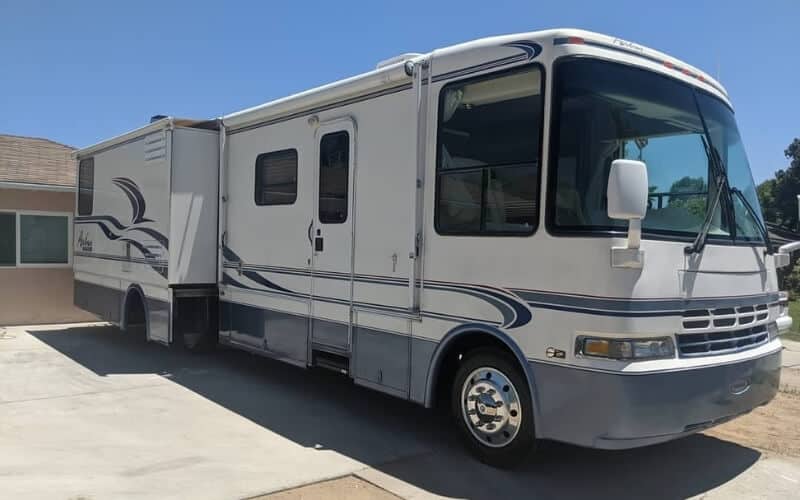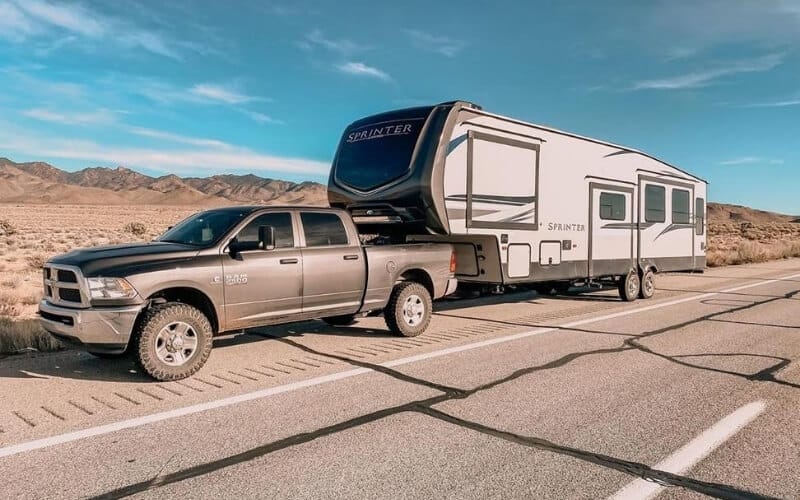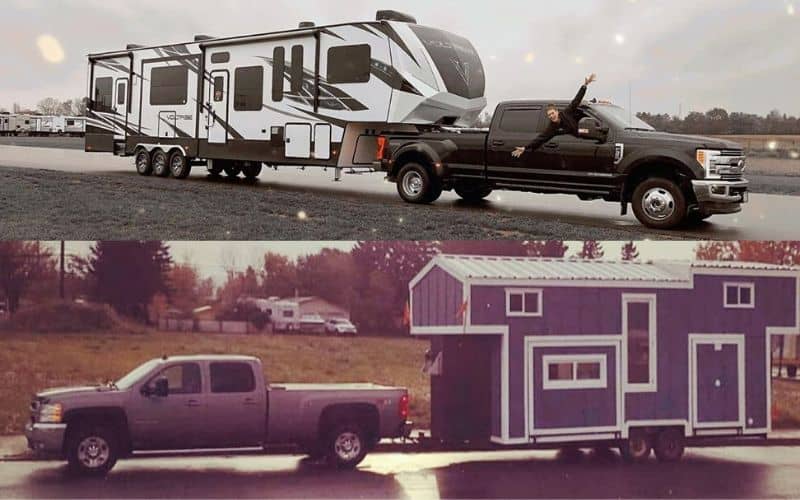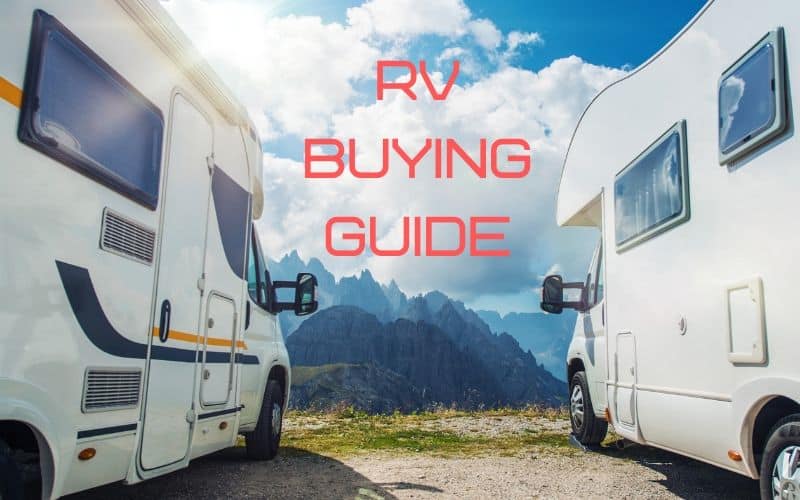When you’re finishing up your purchase of a new RV, one of the most important decisions you’ll need to make is whether or not to pay for the RV’s extended warranty.
There’s always the fear of being saddled with a huge repair bill if things go wrong, but is an RV extended warranty worth it?
This question requires us to dive into the specifics of these RV warranties. You’ll need to understand what exactly they cover and how the nature of accidents or mechanical failures can impact whether or not repairs will be covered under your warranty.
These are just a couple of considerations to keep in mind when deciding whether or not an extended RV warranty is worth it.
Fortunately, we’re going to provide a comprehensive guide to these warranties so that you can make the best decision possible when buying a new RV.
Is An RV Extended Warranty Worth It?
RV extended warranties are definitely worth the added investment if you’re buying a new RV, travel trailer, or 5th wheel. Honestly, if you are in a position to make a significant investment into a new RV, you need to budget to add an extended RV warranty on top of the original factory warranty.
Without one of these warranties, you risk having to shell out a bunch of extra cash to fix major engine or mechanical failures within the first few years of owning a new RV.
Perhaps bigger than anything else, an RV extended service contract will give you the peace of mind you need to really enjoy living and traveling in your new RV.
In my experience, I’ve never purchased an RV that didn’t require some level of mechanical repairs within the first year or two of owning it.
Because I didn’t purchase an extended warranty for those used RVs, I was faced with paying out-of-pocket for all of those repairs.
While you can always try to self-insure your RV by creating an emergency fund, there is always the possibility of unexpected repairs that you just can’t plan for.
And if those repairs are related to your RV’s engine or major mechanical components, they can get really expensive very quickly.
Ultimately, purchasing an RV extended warranty is all about risk management.
If you don’t want to constantly be worried about the unexpected putting you in a financial hole, you should purchase an extended warranty policy for your RV.
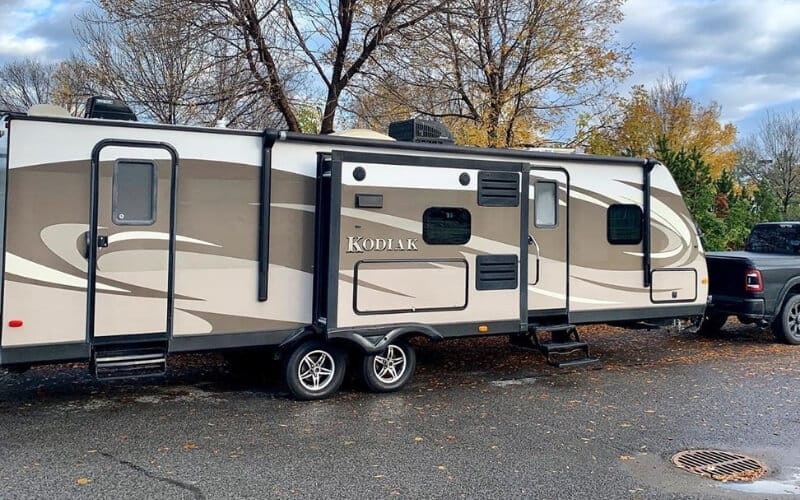
What Is An RV Extended Warranty?
An RV extended warranty is a contract that covers the cost of major mechanical and engine repairs that the manufacturer’s basic warranty won’t cover. This protection is designed to help you cover the costs of repairs for mechanical and electrical failures that occur in your RV during the lifetime of the warranty.
RV extended warranties typically last from one to seven years and they should clearly state what is and what is not covered under the warranty.
There are a number of dealerships and online brokers that offer these warranties, which are also sometimes called extended service contracts.
It’s important to know that these contracts/warranties are in no way associated with the original warranty on the RV.
They are an additional contract that can provide you longer assistance with repair costs than you’d typically enjoy with a factory warranty.
When you’re researching warranty policies, please know that the terms ‘extended warranty’ and ‘extended service contract’ are often utilized interchangeably.
They refer to the same thing, so hopefully you won’t be confused when we use them as such throughout the remainder of this article!
What Does An RV Extended Warranty Cover?
An RV extended warranty covers you from having to pay for major mechanical and electrical breakdowns and repairs on your RV.
This includes issues with your engine, slide-outs, furnace, air conditioning units, water heater, and RV appliances. But there are several different types of RV extended warranties!
To put it briefly, there are exclusionary policies, listed component (also called ‘inclusionary’) warranties, and powertrain-only policies.
Exclusionary contracts cover all non-maintenance repairs that are not specifically listed as ‘exclusions’ on your policy.
Listed component contracts are the exact opposite and they specifically list all mechanical repairs covered on the policy.
And, as you might imagine, powertrain-only warranties only cover the costs of repairs to your RV’s powertrain.
The specific policy that’s best for you will depend on your RV and your comfort level with paying out-of-pocket for some repairs.
So let’s dive into a few more specifics about these three types of RV extended warranties.
1. Exclusionary RV Warranties
This type of RV warranty policy is defined by a list of repairs that are excluded from being covered.
That essentially means that everything that is not listed as being excluded from coverage is within the bounds of the policy.
This type of service contract is typically the most extensive of the extended warranties you can obtain for your RV.
As you might expect, these can also be the most expensive RV extended warranties. That being said, the level of peace of mind they provide can make them worth the adde price.
These warranties typically cover exterior mechanical components associated with your RV’s engine as well as the leveling system, slide-outs, and most of your major indoor appliances.
But it’s always important to carefully read the exclusions in these warranties before purchasing one.
Common elements listed as exclusions on these types of service contracts include damages resulting from collisions, weather damage, complications resulting from poor maintenance, and physical elements like your RV’s exterior paint or interior carpet condition.
2. Listed Component RV Warranties
This type of RV warranty is essentially the opposite of an exclusionary warranty. Instead of listing what is excluded from coverage, this type of warranty is built around a list of what is covered in the policy.
As you might assume, any repairs that are not specifically listed will NOT be covered under this type of RV warranty.
If you choose this type of extended service contract, you’ll have to cover the costs of any repairs that aren’t specifically listed in your policy out-of-pocket.
You may also be able to purchase an additional RV insurance policy to cover these costs (more on this later!).
Some dealerships or online brokers will sell these warranties as ‘comprehensive policies’.
But you should know that term can be misleading because the nature of this type of warranty is that it only covers what is specifically listed in the policy.
Unless you find a warranty with a truly ‘comprehensive’ list of covered repairs, be wary of a policy that claims to be comprehensive.
That being said, these warranties usually include an extensive list of covered repairs.
Some elements that are typically covered under these policies include repairs associated with your HVAC system, leveling jacks, slide-outs, engine components, and major appliances.
The good news about these RV warranties is that they’re typically more affordable than exclusionary contracts.
That makes them a better option for RVers on a budget, but be aware that you’ll probably need to have an emergency fund to help you cover the costs of any repairs or mechanical failures that aren’t specifically listed on your policy.
3. Powertrain-Only RV Warranties
The last type of extended RV warranty we’ll discuss only covers your RV’s powertrain. That includes the engine, drive axle, and transmission.
Many RVers opt for this type of warranty because repairs associated with these elements can be the most costly repairs you’ll undergo over the life of your RV.
And because they offer limited coverage, they’re also more affordable than the other two types of RV warranty policies we listed above.
Their affordability combined with the fact that they cover the most expensive kinds of RV repairs makes this type of warranty an attractive option.
But if you choose a powertrain-only warranty, just know you’ll be responsible for paying for all other repairs out-of-pocket.
Do I Need An RV Extended Warranty If I Already Have RV Insurance?
It’s important to know that an RV extended warranty and RV insurance are two separate things. For starters, proof of insurance is usually a legal requirement when you register a new or used RV.
The minimum coverage requirements will change depending on the state you live in, but most states require a minimum of comprehensive and collision coverage if you’re driving a motorhome.
Getting an extended warranty policy on your RV, however, is not a legal requirement.
An extended service contract is an optional policy that some RV owners decide to purchase to help them cover the costs of repairs and mechanical failures that may occur after the original factory warranty has expired.
In many cases, an extended RV warranty will also help you pay for things that your typical insurance policy doesn’t cover.
Most insurance policies will help you pay for damages resulting from natural disasters, collisions, and theft. But they don’t cover mechanical failures resulting from other circumstances.
So that’s where an extended service contract or RV warranty comes into play.
Getting one of these policies (on top of your legally required RV insurance) will help you pay for engine or mechanical failures that aren’t the result of collisions, theft, or natural disasters.
At the end of the day, you aren’t required to have an RV extended warranty on top of your legally mandated RV insurance.
But many RV owners prefer to purchase a warranty policy because it provides extra peace of mind and protects you against having to pay for expensive, unexpected repairs that you were unprepared to cover.
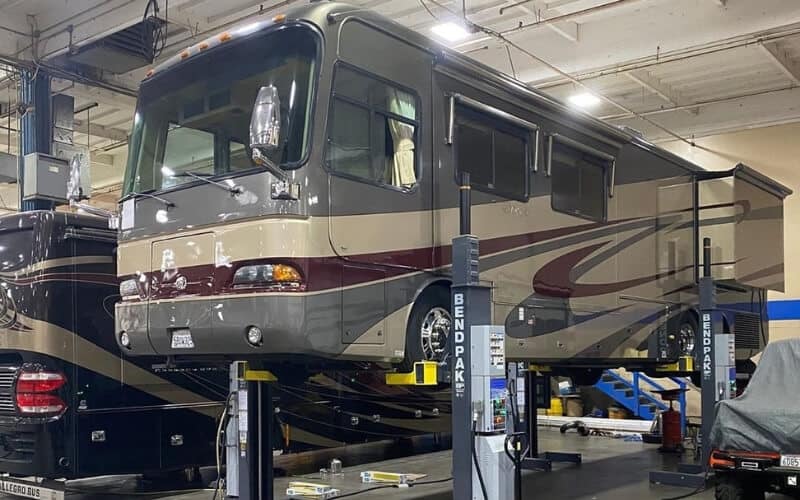
What Are The Benefits Of An RV Extended Warranty?
When your RV needs repairs, it’s really not the parts that typically cost you the most money.
In most cases, it’s the cost of labor required to perform repairs. And, unfortunately, labor costs only seem to be on the rise in recent years.
This is especially true when it comes to RV repairs because of the highly skilled nature of the labor required to fix RVs properly the first time around.
Instead of eating into your travel budget to cover the cost of unexpected repairs, an RV extended warranty will handle those costs.
That means more money remains in your bank account to help you get to your next anticipated RV destination.
Unlike regular vehicles, RVs unfortunately have a higher rate of breaking down and requiring the kinds of expensive repairs that these warranty policies are designed to cover.
In fact, some statistics suggest that an astounding 30% of new RV owners will find themselves dealing with some sort of major mechanical failure within two years of getting their new RV on the road.
That’s honestly a bit of a depressing statistic, but it really highlights the importance of these extended RV warranties because most original factory warranties don’t last much more than one or two years.
So many RV owners find themselves dealing with expensive repairs right when their original warranty runs out.
That’s no fun, but it shouldn’t dissuade you from buying a new RV altogether. That’s precisely why these RV extended service contracts exist.
By purchasing one of these policies, you can not only protect yourself from paying for unexpected repairs, but you can also maintain the resale value of your RV by having the structure in place to handle repairs at the moment they are needed.
Prospective buyers will want to know that the RV they’re interested in has been well-maintained.
And the presence of an extended warranty policy is often a shining signal that you’ve done just that.
In many cases, these policies can also be transferred to the new owner, which provides extra value especially if your buyer is a first-time RVer.
What Are The Cons Of An RV Extended Warranty?
While there are many reasons to purchase an RV extended warranty for your rig, there are a few downsides of these policies that are certainly worth mentioning here.
For starters, these policies can typically only be purchased directly from dealerships or from select online vendors.
This means that it can be difficult to obtain an extended service contract for a used RV or one that is purchased from a private seller.
In addition, purchasing one of these policies will raise your monthly monetary output, which should be considered before you agree on any monthly payment amount for the purchase of the RV itself.
For example, a $400 monthly payment for a new RV might sound great to you initially.
But you’ll also need to factor in the cost of monthly insurance and your extended warranty if you want to know what you’ll truly be forking over on a monthly basis to get into your new RV.
Furthermore, we should reiterate that these warranty policies typically don’t cover damage from collisions, theft, or weather.
And if you don’t read into the fine print of the policy you purchase carefully before doing so, you might later be denied financial assistance when you file a claim for damages that aren’t covered under your specific policy.
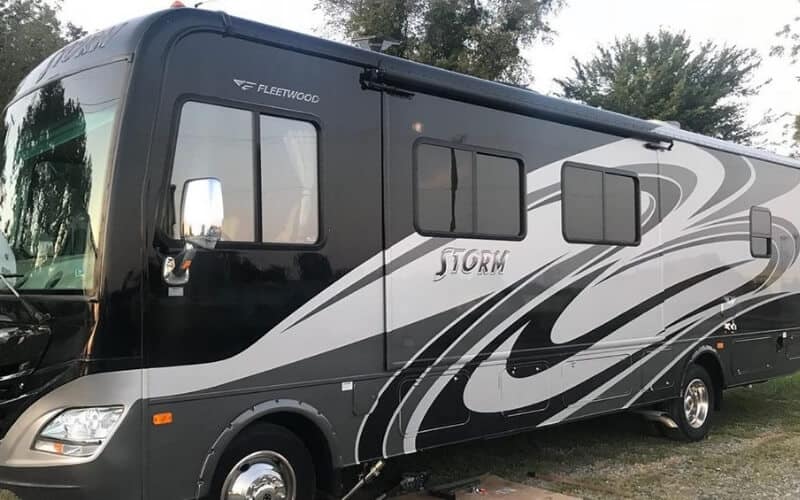
Who Sells RV Extended Warranties?
We’ve already mentioned that there are two primary places you can purchase an RV extended warranty: dealerships and private online brokers.
As with anything on the private market, the quality of customer service and degree of coverage you can receive from these various entities will vary greatly depending on who you choose.
When you’re trying to determine who to purchase one of these warranty policies from, there are several factors you should consider.
First, consider the number of options available. Be wary of any seller who advertises a ‘blanket’ RV extended warranty policy.
As a buyer, you should be able to customize your policy to suit the way you intend to use and travel in your RV.
So the first quality you should look for in a seller is one that provides you with a number of coverage options so that you can customize your policy.
Next, the salesperson helping you customize your policy should be an expert on extended warranties, not just RVs in general.
Your salesperson should be able to break down the complex legal terminology in these contracts so that you can understand it and make a well-informed decision.
That salesperson should also furnish you with a clear and comprehensive copy of the policy you’re interested in.
Never purchase an extended RV warranty without first fully reading through the terms and conditions in the contract.
And if your salesperson can clearly answer any questions that you have while you’re analyzing the contract, consider continuing your research until you find one that can.
After you purchase your policy and set off on your RV adventures, you should be confident that the organization you bought your policy from is going to provide you with ample support for the length of your contract.
This means someone that’s going to be by your side to walk you through the claims process when that time does come.
One of the best ways to analyze the level of ongoing customer service provided by a warranty seller is to peruse user reviews via sites like the Better Business Bureau and others.
If the seller you’re thinking of working with is constantly getting bashed online for their lackadaisical customer service and long phone wait times, consider this an obvious red flag and take your business elsewhere.
Finally, you’ll want to make sure that you’ll be able to take your RV to a large network of repair shops when the need for repair arises.
So you’ll want a warranty seller that works with a nearly unlimited network of repair facilities. Otherwise, you could wind up in a rural area with no “approved” repair facilities within 100 miles.
RVs are meant for traveling. So it makes zero sense to purchase a warranty from a dealership that only works with approved repair facilities in your immediate area.
Only purchase a policy from a vendor that works with repair shops nationwide so that it’ll be easy to find a place to have your RV worked on when an emergency situation arises.
This will also save you from having to pay a towing service to tow your rig hundreds of miles if it suffers damage that renders it undrivable.
So finding a warranty seller that works with an unlimited network of repair shops also saves you money by avoiding unnecessary towing fees.
How Much Does An RV Extended Warranty Cost?
As you might expect, the cost of an RV extended warranty varies. It will fluctuate depending on the level of coverage you desire, the provider you purchase it from, and a host of additional factors. These factors include, but aren’t limited to, the vehicle’s age, mileage, make, model, and advertised value.
Most sellers will encourage you to buy many years of coverage at once rather than going year-to-year.
This will lower your average annual warranty cost and also save you a bunch of time researching and renewing your policy each year.
The timing of your warranty purchase also plays a role in total cost. Most new RV owners are able to find the most affordable contract with the longest service term while their vehicle is still covered under the original factory warranty.
This is why it can be a good idea to purchase an RV extended warranty within the first year of buying a new RV.
This is because warranty providers will determine the cost of your policy based on the risk associated with your RV.
In their eyes, an RV that is no longer under the original factory warranty comes with a greater risk of them (the warranty provider) having to pay for repair costs sometime in the near future.
This is why it’s much more difficult to obtain an extended warranty for a used RV. But it’s not necessarily impossible either.
The warranty provider will probably want to have a full inspection of the RV done, however, and you’ll often end up paying more for a warranty policy on a used RV than you would for a new RV that’s still covered by the original factory warranty.
How To Pick The Right RV Extended Warranty?
Everyone has different priorities when buying an RV extended warranty. This is expected because we all travel and use our RVs in different ways.
But these are five of the most important factors to consider when comparing and contrasting different RV extended service contracts.
Price
The bottom line is the first thing that most of us consider. And you should add the cost of a potential warranty policy to any monthly loan and/or insurance payment you’ll be making on the RV in order to determine what it will really cost you on a monthly basis.
As you might imagine, however, a more comprehensive warranty policy is going to be more expensive. But prices for similar coverage can vary drastically in this industry.
So it’s really important to do plenty of comparison shopping before deciding if you’re better off with the dealership’s extended warranty or one from a private online vendor.
Warranty Type
You’ll also need to decide whether an exclusionary, listed component, or powertrain-only warranty makes the most sense for you.
While powertrain-only warranties are generally the most cost-effective, they won’t cover any major mechanical failures to the appliances that help make your RV comfortable to live and travel in.
Ultimately, you get to decide whether it makes more sense to you to have a list of things your warranty doesn’t cover or a list that it does. And the more it covers, generally, the more it’s going to cost.
Range of Coverage
This is where you really start diving into the fine print of a service contract. You’ll need to feel comfortable with the range of coverage you’re receiving and how much you’re paying for that coverage.
Specific Exclusions
This is really only relevant if you’re choosing an exclusionary contract, but it’s still important to note the specific exclusions that you’re willing to live with when you purchase a new RV extended warranty or service contract.
If you purchase a used RV (or even a new one!) that has a certain mechanical component you’re specifically worried about, you better make sure that component isn’t on the list of exclusions in the service contract you’re purchasing.
Cancellation/Transfer Policy
It’s hard to predict exactly how long you’ll need your policy or even how long you’ll have your RV.
There are a number of cases in which you may find yourself needing to cancel or transfer your warranty policy if your circumstances change.
Unfortunately, not all warranty providers will allow you to easily transfer or cancel your policy down the road.
That can cause you unnecessary headaches when you’re probably worrying about more important things than an extended warranty.
So just make sure that the policy you purchase will be transferable or cancellable if you need to do so down the road.
User Reviews
Because these warranty policies can be so personalized, it’s really important to gather critical information on others users’ experiences with certain warranty providers.
It’s never going to hurt to look up an online provider or dealership online to read what others have said about purchasing extended warranties from them in the past.
When you’re looking through these user reviews, pay close attention to what folks have said regarding timelines for having claims paid, customer service latency times (i.e. how long you have to wait on the phone to actually talk to a real person), and any other issues that might cause you to take your hard-earned dollars elsewhere.
When To Buy An RV Extended Warranty?
The best time to buy an RV extended warranty is within the first year of owning your new RV.
In fact, many RV owners elect to purchase one of these policies at the same time that they’re completing the initial purchase of their RV.
This is because you can often get the best price on an extended warranty before you ever drive your RV off the lot.
When you do leave the lot without a warranty in place, you risk having wear and tear on your rig increase the future price of your warranty policy.
With all warranty providers, an RV with ‘pre-existing conditions’ will almost always require a more costly warranty policy.
And with a used RV, you’ll also need to get an inspection to qualify for most RV extended warranties. This comes at an additional cost to even qualify for certain warranty policies.
Whether you choose to pay in full up-front or select a plan with monthly payments, the best time to buy an RV extended warranty is at the moment of purchasing your RV.
In most cases, this will also allow you to secure a longer service contract period on your warranty.
Best RV Extended Warranty Providers

The easiest place to go to buy an RV extended warranty is the dealership where you’re buying your new RV.
But if you’re beginning to research other online vendors so that you can compare their offers with what you’re getting from the dealership, here are a few extended warranty companies to consider:
1: Good Sam
Good Sam is one of the most recognized names in the RV industry because Good Sam members receive discounts at certain RV parks nationwide.
They also offer a useful roadside assistance plan that I’ve purchased for several of my RVs in the past (but fortunately never had to utilize!).
Good Sam also offers an extended service plan (aka extended warranty) for RVs. They offer plans for motorhomes, travel trailers, and 5th wheels.
But they actually advertise their plan as ‘insurance’ rather than a true ‘warranty’ because you’ll pay monthly instead of shelling out a large lump sum payment at the start of the contract.
For some RVers, this payment structure may provide a degree of financial flexibility you need to get into a new RV.
But after looking through user reviews of their plan, however, we find that opinions fall heavily on both ends of the spectrum.
And it should be noted that Good Sam’s extended service plan for mechanical breakdowns isn’t available for residents of New York and Indiana.
One of the biggest benefits of a Good Sam plan is their nationwide network of repair facilities.
Because it’s such an established brand, you’ll be able to have your repairs completed at any service center in the U.S. and Canada.
The biggest downside that we’ve heard about Good Sam is that they are such a huge company.
That means they aren’t 100% focused on providing the absolute best RV extended warranty possible because they’ve diversified to include many different facets in their overall business plan.
2: Wholesale Warranties
Many experienced RVers trust Wholesale Warranties when it comes to buying an RV extended warranty.
They are an independent brokerage that deals directly with consumers and specifically focuses on providing comprehensive warranty policies for RV, travel trailers, 5th wheels, and even personal vehicles.
They offer all three types of warranty policies that we covered above and help you customize your protection plan depending on your vehicle and personal preferences.
As their name suggests, they also advertise their plans at ‘wholesale’ prices rather than the mark-ups you’ll typically find from plans offered by dealerships.
After looking through some user reviews, this company’s Viking Protection Plan seems to stand out from the rest.
It offers coverage for consequential damage and can also be utilized for commercial use if you think you’ll ever be renting your RV out.
But if you are looking into this company, you’ll be able to request a free personalized quote so that you can better compare with a dealer’s warranty offer.
Additionally, Wholesale Warranties has many former users that rave about their positive customer service and dedication to supporting you through the claims process.
So it’s not surprising that they have an A+ rating with the Better Business Bureau.
3: Protective Asset Protection
The warranty coverage offered by Protective Asset Protection has been endorsed by the Recreation Vehicle Dealers Association (RVDA) since 1992.
This means that the company and its policies have been extensively evaluated for quality, dependability, and overall value.
But it should also be noted that the RVDA does receive compensation from certain companies for business generated by RV dealers.
So it’s important to know that the evaluation process may not be as balanced and unbiased as it could possibly be in this situation.
But let’s get to the policies provided by Protective Asset Protection. This company offers two different extended warranty programs that are called XtraRide and JayPlus.
From user reviews, it seems that XtraRide is the more preferred plan of the two. It includes extra benefits like towing and roadside service, technical support, and fuel and L.P. gas replacement.
If you’re trying to research this company, it’s important to know that they no longer handle warranty requests directly from the public.
Instead, they only offer their warranties through RV dealerships at the time of an RV purchase.
This means you won’t be able to purchase a policy on a pre-owned RV or at any time in the future after your RV purchase.
Another unfortunate part about this warranty provider is that the price of their policies will then be marked up by said dealership.
That also means that it can be difficult to obtain an advance quote from this company for their policies, which makes comparing with warranties from other companies virtually impossible.
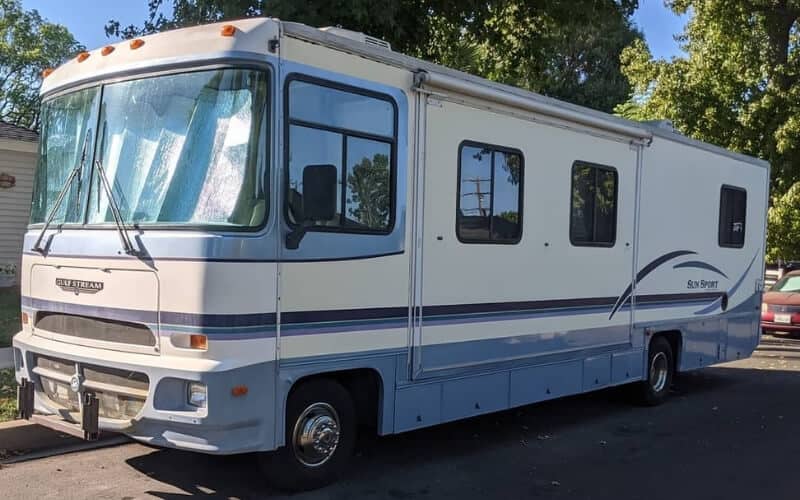
Should I Get An Extended Warranty For A Used RV?
It depends on the age and condition of the used RV you’re buying. You can certainly still get an extended warranty for a used RV, but it will certainly require a full inspection to see if the RV will qualify for a warranty policy.
That inspection will also allow you and your warranty provider to clearly establish the state of your RV and its condition at the outset of your warranty policy.
This is important for you and your warranty provider to be on the same page about what will (and what will not) be covered in your policy.
If the used RV you’re interested in is between one and 15 years old, it will most likely still qualify for a policy with full exclusionary coverage.
If your RV is older than that, it may only be eligible for a powertrain-only warranty.
That being said, the cost of a full extended warranty policy may not always make sense for older RVs.
That’s because the price of these policies is often higher, but the term of coverage is often much shorter than the terms for policies on newer RVs.
For a used RV, you shouldn’t shy away from getting that thorough inspection because it will allow you to identify mechanical or engine issues that may be more important to insure yourself against.
This will allow you to customize a warranty policy for limited components on your RV, which can give you peace of mind at a lower price point than a full exclusionary policy.
And finally, we recommend dealing directly with a warranty provider that deals directly with consumers if you’ve purchased a used RV.
Not all warranty providers sell directly to the consumer, but a company that does is essential to find if you’ve purchased a new or pre-owned RV.
How To Get The Most Out Of Your RV Extended Warranty?
Many new RV owners make the mistakes of forgetting that they purchased an extended warranty policy, but we understand how this can happen.
You’ll obtain a lot of new paperwork when you first buy a new RV. So there can be a natural tendency to file all of that paperwork away and move on with actually enjoying life in your new rig.
But you shouldn’t get stuck paying for any repairs or mechanical failures that are covered under your warranty.
Otherwise, you’re just paying double and you’re certainly not getting the most out of your RV extended warranty.
If you haven’t looked at your policy in a while, take some time to refamiliarize yourself with everything that’s covered in your warranty.
That way you’ll refresh yourself on what you can call in and file a claim for if something does go wrong in your upcoming RV adventures.
You should also take some time to make sure you know how to get in touch with the dealership or online broker that you purchased the policy from.
You’ll want to know the exact steps you need to take in order to file a claim if and when something happens.
And you’ll also need to know what kind of proof and documentation you’ll be required to provide so that you don’t miss an opportunity to receive assistance with a major mechanical repair on your RV.
In terms of peace of mind, knowing all of this ahead of time will help you avoid hitting those unhealthily high-stress levels when it does come time to make the most of your RV’s extended service contract.
How To Transfer Or Cancel An RV Extended Warranty?
It is possible to transfer or cancel an RV extended warranty once you’ve purchased one. Some RV owners choose to transfer their warranty policy if they sell their RV while the warranty is still in effect.
If you have even the slightest inkling that you may want to transfer your policy in the future, you’ll need to check with your provider to make sure your policy is transferable before you buy it.
As long as it is, you’ll simply need to follow the process set forth by your warranty provider to transfer the policy.
In many cases, this will require a thorough inspection of your rig to note its exact condition at the time of transfer.
And you may also be required to pay a small transfer fee, which can be negotiated into the price of your RV sale depending on your preference.
But if your buyer isn’t interested in inheriting your warranty, you’ll need to cancel it. In most cases, cancelling an RV extended warranty requires filling out a form with certain updated information on your rig.
These forms can vary depending on the dealership or private broker you purchased through, but the most critical information to include is your RV’s mileage and the date you wish to have the policy cancelled.
Both dealerships and private warranty brokers can often receive commissions when they sell you a policy.
So that means that they can sometimes drag their feet on processing a warranty cancellation request.
Don’t be afraid to keep calling your provider to make sure they’ve processed that request in a timely fashion.
So, Is An RV Extended Warranty Worth It?
If you’ve just purchased a new RV, an RV extended warranty is DEFINITELY worth it! You’ll get to choose exactly which type of warranty policy suits you best.
But most original factory warranties simply aren’t going to provide the level of protection and security that you should have if you’ve just bought a new RV.
Consider this: in addition to 30% of new RVs requiring major mechanical repairs within the first two years, almost 80% suffers major mechanical failure within five years.
By year eight, it’s hard to find an RV out there that hasn’t required a major mechanical repair of some fashion or another.
These timeframes are a long ways past the length that most original factory warranties cover.
So the only way to make sure you have extra financial assistance when something unexpected goes wrong years into the future is to purchase an RV extended warranty!

